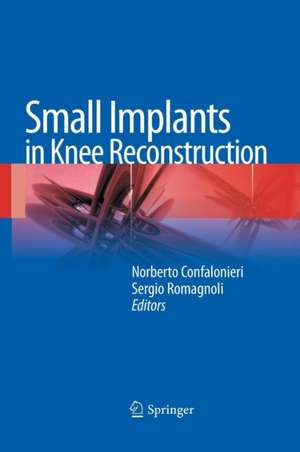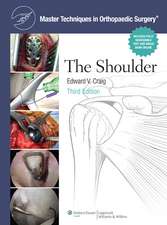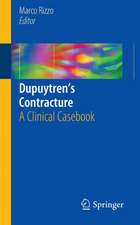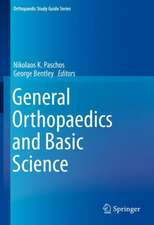Small Implants in Knee Reconstruction
Editat de Norberto Confalonieri, Sergio Romagnolien Limba Engleză Hardback – 6 dec 2012
In this book, international experts discuss truly minimally invasive knee reconstruction techniques that involve tissue-sparing surgery and small implants and permit preservation of both the anterior and the posterior cruciate ligament. These techniques have the key advantage of respecting the physiological joint biomechanics. They also entail minimal removal of bone tissue from the tibia and only a small skin incision that avoids damage to the extensor apparatus. All of the most innovative techniques used in uni- and bicompartmental knee reconstruction are covered in detail, including computer-assistedprocedures. Long-term results are reported, and pitfalls, highlighted. The reader will learn how, with careful selection of patients and rigorous surgical technique, compartmental reconstruction offers a valid alternative to total knee replacement.
| Toate formatele și edițiile | Preț | Express |
|---|---|---|
| Paperback (1) | 838.41 lei 6-8 săpt. | |
| Springer – 23 aug 2016 | 838.41 lei 6-8 săpt. | |
| Hardback (1) | 725.42 lei 6-8 săpt. | |
| Springer – 6 dec 2012 | 725.42 lei 6-8 săpt. |
Preț: 725.42 lei
Preț vechi: 763.60 lei
-5% Nou
Puncte Express: 1088
Preț estimativ în valută:
138.81€ • 145.32$ • 114.86£
138.81€ • 145.32$ • 114.86£
Carte tipărită la comandă
Livrare economică 05-19 aprilie
Preluare comenzi: 021 569.72.76
Specificații
ISBN-13: 9788847026544
ISBN-10: 8847026547
Pagini: 184
Ilustrații: XII, 171 p.
Dimensiuni: 178 x 254 x 17 mm
Greutate: 0.66 kg
Ediția:2012
Editura: Springer
Colecția Springer
Locul publicării:Milano, Italy
ISBN-10: 8847026547
Pagini: 184
Ilustrații: XII, 171 p.
Dimensiuni: 178 x 254 x 17 mm
Greutate: 0.66 kg
Ediția:2012
Editura: Springer
Colecția Springer
Locul publicării:Milano, Italy
Public țintă
Professional/practitionerCuprins
The reason of a choice.- Small Implants: Past, present and future.- Biomechanical problems sacrificing ACL and PCL in knee replacement.- Mobile and fixed bearing in UKR: indications vs Ostheotomies (HTO) and Total Prosthesis.- UKR Surgical Technique.- Pearls and Pitfalls.- UKR with mobile bearing – long term results (C.Dodd).- UKR in the lateral compartment: long term results and surgical tricks.- UKR Computer Assisted (CAS): surgical technique and results.- Bicompartmental (Bi-UKR) Knee Reconstruction: Indications and results.- Bi-UKR vs TKR computer assisted - Tissue Sparing Surgery (TSS) and CAS in knee reconstruction.- UKR and Patello Femoral Arthroplasty (PFA) bicompartmental reconstruction: indication and results.- Surgical technique and long term results of bicompartmental reconstruction with small implants (JN Argenson).- Arthrosurface and Unicup: indications, surgical tecnique and results.- Isolated PFA: indications and results.- Bi-Compartimental arthroplasty (Deuce):indications, surgical technique and results.- Revision of small implants.- Robot and small implants: surgical tecnique and early results.
Textul de pe ultima copertă
Minimally invasive joint replacement has become one of the hottest topics in the orthopedic world. In the case of the knee, however, this concept has been widely misunderstood. All too frequently it is taken to mean keyhole surgery in which traditional components are implanted with a shorter surgical time. Such an approach in fact has few benefits and various possible dangers.
In this book, international experts discuss truly minimally invasive knee reconstruction techniques that involve tissue-sparing surgery and small implants and permit preservation of both the anterior and the posterior cruciate ligament. These techniques have the key advantage of respecting the physiological joint biomechanics. They also entail minimal removal of bone tissue from the tibia and only a small skin incision that avoids damage to the extensor apparatus. All of the most innovative techniques used in uni- and bicompartmental knee reconstruction are covered in detail, including computer-assistedprocedures. Long-term results are reported, and pitfalls, highlighted. The reader will learn how, with careful selection of patients and rigorous surgical technique, compartmental reconstruction offers a valid alternative to total knee replacement.
In this book, international experts discuss truly minimally invasive knee reconstruction techniques that involve tissue-sparing surgery and small implants and permit preservation of both the anterior and the posterior cruciate ligament. These techniques have the key advantage of respecting the physiological joint biomechanics. They also entail minimal removal of bone tissue from the tibia and only a small skin incision that avoids damage to the extensor apparatus. All of the most innovative techniques used in uni- and bicompartmental knee reconstruction are covered in detail, including computer-assistedprocedures. Long-term results are reported, and pitfalls, highlighted. The reader will learn how, with careful selection of patients and rigorous surgical technique, compartmental reconstruction offers a valid alternative to total knee replacement.
Caracteristici
Detailed description of minimally invasive knee reconstruction techniques involving small implants Presentation of long-term results and description of pitfalls Written by established international experts
















